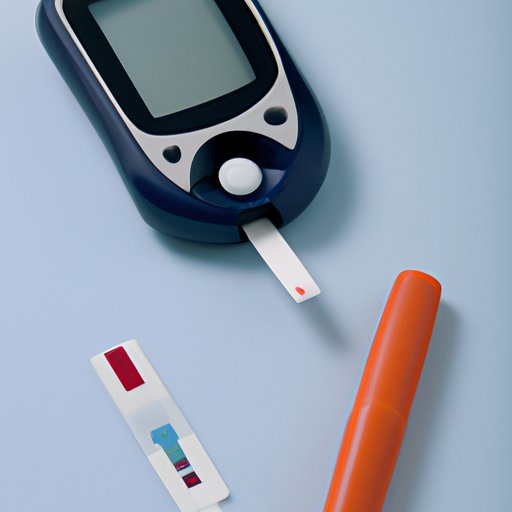
Introduction
Diabetes is a chronic disease that affects millions of people worldwide. It is a condition in which the body cannot produce or effectively use insulin, a hormone that regulates blood sugar levels. Left untreated, diabetes can lead to serious health complications. That is why it is essential to get tested for diabetes regularly. In this article, we will provide a step-by-step guide on how to get tested for diabetes and the importance of early detection.
5 Simple Steps to Getting Tested for Diabetes: A Beginner’s Guide
Step 1: Understand the Different Types of Diabetes Tests
There are several types of diabetes tests, including:
- Fasting plasma glucose test
- Random plasma glucose test
- Oral glucose tolerance test
- Hemoglobin A1c test
It is important to understand the differences between these tests to determine which one is best for you.
Step 2: Evaluate Your Risk Factors for Diabetes
Some risk factors for diabetes include:
- Being overweight or obese
- A family history of diabetes
- Being over 45 years old
- Sedentary lifestyle
- High blood pressure
- High cholesterol
If you have any of these risk factors, you should consider getting tested for diabetes.
Step 3: Consult With Your Doctor or Healthcare Provider
Your doctor or healthcare provider can help you determine the appropriate diabetes test for you. They can also advise you on any additional steps you need to take to prepare for the test.
Step 4: Prepare for the Diabetes Test
Depending on the diabetes test you are taking, you may need to prepare by fasting or limiting your food and drink intake beforehand. Your doctor or healthcare provider will provide instructions on how to prepare for the test.
Step 5: Take the Diabetes Test and Follow-Up With Your Results
After taking the diabetes test, make sure to follow-up with your doctor or healthcare provider for the results. Depending on the results, they may recommend further testing or treatment.
Why Early Detection is Key: Understanding Diabetes Testing Methods
Explanation of the Importance of Early Detection for Diabetes
Early detection of diabetes is crucial because it can prevent or delay the onset of serious complications. These complications include heart disease, kidney damage, and nerve damage. Early detection can also lead to early treatment, which can improve overall health outcomes.
Overview of the different diabetes testing methods
There are several methods for testing for diabetes, including:
- Fasting plasma glucose test
- Random plasma glucose test
- Oral glucose tolerance test
- Hemoglobin A1c test
Explanation of the Benefits and Drawbacks of Each Method
Each testing method has its advantages and disadvantages. For example, the fasting plasma glucose test is a convenient test that is often performed in the morning before eating. However, it may not be as accurate as other tests and may require repeat testing.
On the other hand, the oral glucose tolerance test is more accurate but requires more preparation and takes longer to complete. Your doctor or healthcare provider can help you determine which test is best for you based on your individual needs.
From Symptoms to Diagnosis: The Path to Getting Tested for Diabetes
Explanation of Common Diabetes Symptoms
Some common symptoms of diabetes include:
- Frequent urination
- Increased hunger and thirst
- Unexplained weight loss
- Fatigue
- Blurred vision
Discussion of How to Determine if You Need a Diabetes Test
If you are experiencing any of these symptoms or have any of the risk factors for diabetes, talk to your doctor or healthcare provider about getting tested.
Overview of the Diagnosis Process and What to Expect
If you do get diagnosed with diabetes, your doctor or healthcare provider may prescribe medication, recommend dietary changes, and suggest regular exercise to manage the condition.
Don’t Wait Until It’s Too Late: How to Start the Diabetes Testing Process
Explanation of the Risks Associated With Delaying Diabetes Testing
Delaying diabetes testing can increase your risk of developing serious complications. It is essential to get tested regularly to catch the condition early.
Discussion of Overcoming Common Barriers to Diabetes Testing
Some common barriers to diabetes testing include fear of the test, lack of awareness, and financial concerns. Talk to your doctor or healthcare provider about any concerns you may have about testing.
Tips for Starting the Testing Process
Some tips for getting started with diabetes testing include:
- Making an appointment with your doctor or healthcare provider
- Researching testing facilities in your area
- Asking your insurance provider about coverage for diabetes testing
Tools and Resources: How to Locate and Schedule a Diabetes Test Near You
Overview of Available Diabetes Testing Resources
There are several resources available for diabetes testing, including:
- Your doctor or healthcare provider
- Testing facilities
- Public health clinics
Explanation of How to Locate Testing Facilities in Your Area
You can use online search tools or ask your doctor or healthcare provider for recommendations on testing facilities in your area.
Tips for Scheduling a Diabetes Test
Some tips for scheduling a diabetes test include:
- Making the appointment at a convenient time for you
- Preparing for the test as instructed by your healthcare provider
- Following-up with your doctor or healthcare provider for the results
Conclusion
Getting tested for diabetes is crucial for early detection and prevention of serious complications. With this step-by-step guide, you can take control of your health and ensure that you are taking the necessary steps to manage your diabetes.





